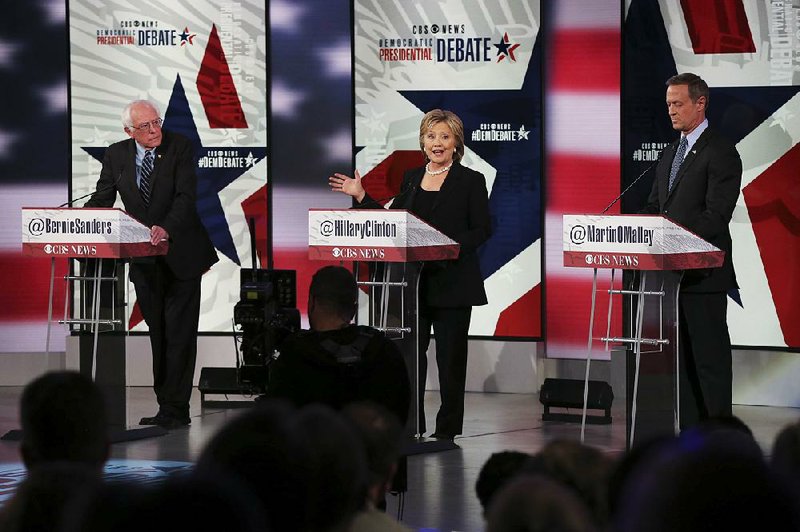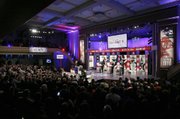Democratic presidential candidates made a unanimous declaration of resolve to rid the globe of the Islamic State in a heartland presidential debate Saturday night that was overshadowed by an act of terrorism in Europe.
RELATED ARTICLE
http://www.arkansas…">GOP candidates call for U.S. to confront terrorism
This second Democratic debate, broadcast on CBS and moderated by John Dickerson of Face the Nation, took place at Drake University in Des Moines, Iowa.
After a moment of silence to honor the victims of attacks in Paris by gunmen and suicide bombers linked to the Islamic State, Hillary Rodham Clinton, Sen. Bernie Sanders and Martin O'Malley all expressed a determination to take strong action against the terrorist group. Sanders promised to "rid this planet of this barbarous organization," and O'Malley said Americans must recognize "the new face of conflict and warfare." Clinton, the former secretary of state, seized the moment to make the case that she has the best qualifications to lead the country.
"This is not only about electing a president, it's also about choosing our next commander in chief," said Clinton, who called the Islamic State "the leading threat of an international terror network."
"It cannot be contained," she continued, using a term that has led to intense criticism of President Barack Obama's strategy against the group. "It must be defeated."
A month after the Democratic presidential candidates clashed on gun control and financial regulations in their first debate, which focused largely on domestic and economic issues, they faced more questions on foreign policy and national security. Hours after the deadly attacks, CBS News, a co-host of the event, said it would refocus the debate to give candidates an opportunity to discuss how they would respond to such an international crisis.
Despite the tragic nature of the events, the new backdrop was expected to represent an opportunity for Clinton to shine. Neither of her two remaining rivals, Sanders and O'Malley, has much foreign-policy experience.
The changes necessitated by the tragedy may represent "an opportunity" for Clinton, said Drake University political science professor Dennis Goldford. "She can make the claim that she has the experience that would give her credibility on foreign-policy issues." The somber backdrop of the attacks also may make it more difficult for underdogs Sanders, a U.S. senator from Vermont, or O'Malley, a former Maryland governor, to attack Clinton, or to change the subject to domestic issues where they have more substantial records.
Clinton defended the Obama administration's initial approach to the rise of the Islamic State, including her actions as secretary of state. The Islamic State is also known by the acronym ISIS.
She rejected the notion that she underestimated the militants and blamed their rise on leaders in the Middle East, saying that former Iraqi Prime Minister Nouri al-Maliki did not do enough to maintain stability in Iraq once the U.S. turned over control of the nation.
Sanders responded by criticizing her vote as a New York senator for the resolution to allow the 2003 invasion of Iraq. Sanders said, "I don't think any sensible person" would have supported the use-of-force resolution, and called the invasion "the worst foreign-policy blunder in the history of the United States."
He called the fight against the Islamic State a "war for the soul of Islam," and said other Muslim countries in the region will need to get "deeply involved" and lead the effort.
O'Malley said that simply toppling dictators is not a suitable foreign policy for the 21st century, referring to the U.S. invasion of Iraq in 2003.
He said Syria, Libya and Afghanistan are "a mess" and that the United States isn't doing enough to build stable democracies after toppling dictators.
Clinton has a history of advocating for more robust involvement across the globe -- both as a presidential candidate eight years ago and as Obama's secretary of state. In recent weeks, she has called for a more aggressive U.S. role in the Syrian conflict, including a no-fly zone over the area, a move the Obama administration opposes. But she stood by her opposition to seeking a formal declaration of war against the Islamic State.
They gave some fodder to their Republican critics, who coupled condemnation of the Paris attacks during the day with sharp criticism for Obama and Clinton.
"We are at war with violent extremism, we are at war with people who use their religion for purposes of power and oppression," said Clinton, arguing the U.S. is not at war with Islam or all Muslims. "I don't want us to be painting with too broad a brush."
Sanders and O'Malley agreed with her sentiments, saying the term "radical Islam" used by Florida's Sen. Marco Rubio and other Republican presidential candidates is unnecessarily offensive to American Muslims.
Republicans immediately seized on the remarks. "Yes, we are at war with radical Islamic terrorism," tweeted former Florida Gov. Jeb Bush.
Since Clinton's debate performance in October, her poll numbers have surged, and three of her rivals for the nomination have dropped out.
Former Rhode Island Gov. Lincoln Chafee and former Sen. Jim Webb of Virginia have dropped out of the race. Lawrence Lessig, a Harvard professor who was running as a Democrat but was not included in that debate, also stopped his campaign.
Sanders got another opportunity to take a harder line against Clinton, after he dismissed the controversy surrounding her use of a private email server as secretary of state and largely avoided attacking her directly in their first face-off.
On Saturday night, both Sanders and O'Malley painted Clinton as a lackey for Wall Street and corporate interests.
"Let's not be naive about it," said Sanders, noting that Clinton collected millions in campaign donations from Wall Street bankers. "They expect to get something. Everybody knows that."
The barbs marked a far more aggressive shift in a primary race that has so far been notable for its civility. Democrats have spent months boasting about the substantive tone of their contest, attempting to set up a favorable early contrast with the "carnival barker" insults of the crowded Republican primary.
The conversation later pivoted to economic issues, with the candidates tangling over how to pay for their plans to expand college affordability, family leave and prescription drug coverage.
The conversation revealed how Sanders' message has helped shift the party to the left on some economic issues.
All three agreed that high earners and corporations should pay more in taxes to benefit the middle class. They tangled over how much to increase the minimum wage, with Clinton backing a $12-per-hour federal floor while Sanders and O'Malley said $15 an hour -- the rate being pushed by a campaign of fast-food workers and labor unions. And they fought over the degree to which they would curtail large financial institutions, with Sanders describing Wall Street's business model as "greed and fraud."
"I'm not that much of a socialist compared to [Dwight D.] Eisenhower," joked Sanders, saying the former president backed a 90 percent marginal tax rate.
While Clinton is wary of alienating Sanders backers whose support she'll need should she win the nomination, she did take a few shots. She attempted to cast some of Sanders' major proposals, including a single-payer health care system and free college, as politically unrealistic.
"The revolution never came," she said, in a knock on his call for a political revolution. "I waited and I got the scars to show for it."
Information for this article was contributed by Alan Rappeport of The New York Times; by Margaret Talev and Jennifer Epstein of Bloomberg News; by David A. Fahrenthold of The Washington Post; and by Lisa Lerer and Ken Thomas of The Associated Press.
A Section on 11/15/2015


